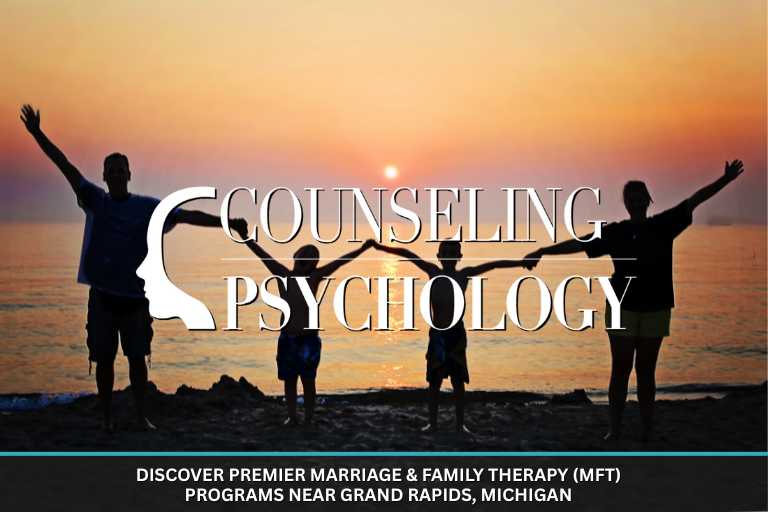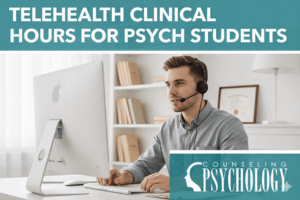Find Premier Marriage & Family Therapy (MFT) Programs Near Grand Rapids, Michigan

Marriage and family therapy plays a crucial role in promoting mental health and strengthening the quality of relationships across all stages of life. As rates of stress, divorce, and family-related challenges continue to affect communities nationwide, the U.S. Bureau of Labor Statistics projects that employment for marriage and family therapists will grow much faster than the average for all occupations. This anticipated expansion reflects not only national demand but also the increasing recognition of the value MFT professionals bring to addressing complex interpersonal and systemic issues.
In Grand Rapids, Michigan, these national trends align closely with local priorities. The city's emphasis on community wellness, its strong healthcare infrastructure, and its diverse and growing population create an environment where skilled therapists can have a meaningful impact. Opportunities to work with clients from a range of cultural, socioeconomic, and generational backgrounds help shape versatile and adaptive practitioners. Such exposure during training enhances readiness for real world practice.
From families who have deep roots in the region to those newly arrived, residents in Grand Rapids benefit from accessible therapy services that address both individual concerns and broader relationship dynamics. Programs in the area equip future therapists to navigate these varied contexts with approaches grounded in evidence-based methods, cultural sensitivity, and collaborative care models.
2026 Discover Premier Marriage & Family Therapy (MFT) Programs Near Grand Rapids, Michigan
Western Michigan University
Kalamazoo, MI - Public 4-Year - wmich.edu
Master's - M.A. in Marriage, Couple, and Family Counseling
Online & Campus Based - Visit Website
Western Michigan University's Marriage, Couple, and Family Counseling master's program offers a robust 60-hour curriculum emphasizing sophisticated family systems approaches. The hybrid program strategically combines in-person and online learning, providing comprehensive clinical training across Kalamazoo and Grand Rapids sites. Targeting psychology graduates with a minimum 3.0 GPA, students benefit from extensive hands-on experience preparing for professional counselor and marriage and family therapist licensure. The program's collaborative Family Sciences focus and flexible instructional model position graduates for significant growth in counseling professions, addressing increasingly complex interpersonal and familial dynamics.
- 60-hour master's program
- Family systems approach
- 3.0 GPA minimum requirement
- On-site clinics Kalamazoo/Grand Rapids
- Licensure pathway options
- Mostly in-person instruction
- Hybrid/online course options
- Collaboration with Family Sciences
Why Grand Rapids Is a Strategic Location for MFT Training
Grand Rapids offers a strong foundation for MFT training due to its varied client base and active mental health network. Students benefit from clinical placements in healthcare systems, nonprofit organizations, and counseling centers. The city's collaborative approach to care allows MFT trainees to work alongside social workers, physicians, and educators, reinforcing the value of interdisciplinary practice.
Michigan MFT programs require candidates to complete an accredited graduate program and at least two years of supervised post-degree clinical experience, as outlined by the Michigan Department of Licensing and Regulatory Affairs. Grand Rapids programs help students meet these requirements by offering access to diverse practicum settings and professional connections.
Core Components of an MFT Program
Before enrolling, it is important to understand the primary elements of a quality MFT program:
- Foundational Coursework: Family systems theory, lifespan development, multicultural counseling, and human sexuality.
- Clinical Skills Training: Supervised practicum and internships with direct client interaction.
- Ethics and Legal Standards: Michigan laws, client confidentiality, and professional boundaries.
- Research Methods: Evaluation of treatment outcomes and application of evidence-based approaches.
In Grand Rapids, coursework may be adapted to address regional issues such as rural-urban relationship challenges, cultural adaptation, and intergenerational conflict.
Building Cultural Competence in West Michigan
Serving a culturally diverse population requires therapists to develop strong cultural awareness, flexibility, and the ability to adapt treatment approaches to meet varied needs. In Grand Rapids, students benefit from training programs that integrate experiential learning opportunities with community organizations, faith-based groups, and immigrant support services. These partnerships offer hands-on exposure to different cultural traditions, communication styles, and family structures, helping future therapists move beyond theory into practical, context-sensitive application.
Such experiences also foster the ability to address language barriers, cultural stigmas surrounding mental health, and generational differences in how families approach therapy. By engaging directly with community members in a variety of settings, such as neighborhood centers, cultural festivals, and outreach programs, students gain insight into the unique strengths and challenges each group brings to the therapeutic process.
This comprehensive preparation equips graduates to deliver inclusive, respectful, and effective therapy that reflects the diverse needs of the population. In turn, these skills contribute to building trust within the community and supporting positive outcomes for clients from all walks of life.
Career Pathways for Grand Rapids MFT Graduates
Graduates can pursue a variety of roles, such as:
- Family Therapy in Private Practice: Providing individualized, couple, and family counseling in a self-directed setting, often allowing for a tailored approach to client needs, flexible scheduling, and the ability to specialize in specific family or relationship concerns.
- Clinical Work in Community Mental Health Agencies: Delivering services to diverse populations, often focusing on underserved or at-risk communities, and addressing a range of mental health challenges within a family systems framework.
- Behavioral Health Positions in Hospitals: Collaborating with multidisciplinary healthcare teams to provide integrated mental health care for patients, often in settings that address acute mental health crises or chronic health conditions affecting family dynamics.
- Counseling Roles in School and University Settings: Supporting students and their families through academic, social, and emotional challenges, and working alongside educators to promote healthy relationships and resilience within educational environments.
- Crisis Intervention with Nonprofit Organizations: Offering immediate support to individuals and families experiencing urgent mental health situations, such as domestic violence, grief, or disaster-related trauma, often within mission-driven community service contexts.
These opportunities are supported by Grand Rapids' expanding healthcare sector and strong investment in mental health services.
Steps to Becoming a Licensed MFT in Michigan
Navigating the licensure process is an essential step for anyone entering the field, and understanding each requirement upfront can save both time and effort. The following table outlines the primary stages of becoming a licensed marriage and family therapist in Michigan, from academic preparation through ongoing professional development.
| Step | Requirement | Details |
| 1 | Earn Graduate Degree | Accredited master's or doctoral program in marriage and family therapy (COAMFTE or equivalent) |
| 2 | Complete Clinical Hours | Required supervised client contact hours during and after training |
| 3 | Pass National MFT Exam | Demonstrates competency across therapy domains |
| 4 | Apply for Licensure | Submit application to Michigan Board of Counseling |
| 5 | Maintain Licensure | Meet continuing education requirements |
Leveraging Grand Rapids' Professional Network
Active participation in local professional networks can significantly enhance career prospects by fostering meaningful relationships with other mental health professionals, potential employers, and community leaders. Engaging with colleagues at workshops, conferences, and peer groups not only supports ongoing professional development but also helps practitioners exchange practical insights, discuss emerging trends, and explore innovative treatment strategies. In Grand Rapids, these events often feature region-specific case studies and policy discussions, offering participants a deeper understanding of the unique needs of the local population. This involvement can also open doors to mentorship opportunities, collaborative research projects, and referrals that strengthen both professional growth and the quality of care provided to clients.
Real World Applications of MFT Skills
MFT graduates in Grand Rapids often work with:
- Couples navigating life transitions such as parenthood or retirement: Guiding partners through the challenges of changing roles, evolving identities, and shifting relationship dynamics, while fostering healthy communication and conflict resolution.
- Families managing chronic illness or disability: Supporting family members in developing coping strategies, strengthening emotional resilience, and maintaining a balanced family system while addressing the emotional and practical impacts of long-term health concerns.
- Individuals coping with trauma within family systems: Providing therapy that addresses both the personal effects of trauma and its influence on family relationships, using evidence-based interventions to promote healing and restore trust.
Programs in the city provide case-based learning with simulated and real client scenarios, enabling students to apply theoretical knowledge in practical situations. This approach helps future therapists develop problem solving skills, cultural sensitivity, and confidence in handling diverse and complex cases they will encounter in professional practice.
The Future of MFT in Grand Rapids
With mental health awareness rising and the demand for relationship-focused therapy increasing, MFT graduates in Grand Rapids can expect a robust job market. The city's dedication to integrated care ensures that therapists are valued contributors to community well-being, making it an ideal place to train, practice, and grow in the profession.
Sources
- U.S. Bureau of Labor Statistics: Marriage and Family Therapists
- American Association for Marriage and Family Therapy
- Michigan Department of Licensing and Regulatory Affairs
- Commission on Accreditation for Marriage and Family Therapy Education
- National Board for Certified Counselors



